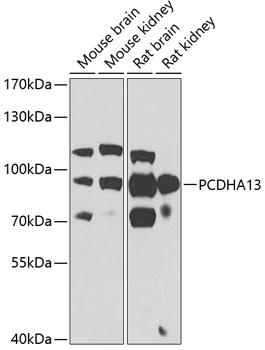
WB analysis of various sample lysates using GTX32774 PCDHA13 antibody. Dilution : 1:1000 Loading : 25microg per lane
PCDHA13 antibody
GTX32774
Overview
- SupplierGeneTex
- Product NamePCDHA13 antibody
- Delivery Days Customer9
- Application Supplier NoteWB: 1:500 - 1:2000. *Optimal dilutions/concentrations should be determined by the researcher.Not tested in other applications.
- ApplicationsWestern Blot
- CertificationResearch Use Only
- ClonalityPolyclonal
- ConjugateUnconjugated
- Gene ID56136
- Target namePCDHA13
- Target descriptionprotocadherin alpha 13
- Target synonymsCNR5; CNRN5; CNRS5; CRNR5; KIAA0345-like 1; ortholog of mouse CNR5; PCDH-ALPHA13; PCDH-alpha-13; protocadherin alpha-13
- HostRabbit
- IsotypeIgG
- Protein IDQ9Y5I0
- Protein NameProtocadherin alpha-13
- Scientific DescriptionThis gene is a member of the protocadherin alpha gene cluster, one of three related gene clusters tandemly linked on chromosome five that demonstrate an unusual genomic organization similar to that of B-cell and T-cell receptor gene clusters. The alpha gene cluster is composed of 15 cadherin superfamily genes related to the mouse CNR genes and consists of 13 highly similar and 2 more distantly related coding sequences. The tandem array of 15 N-terminal exons, or variable exons, are followed by downstream C-terminal exons, or constant exons, which are shared by all genes in the cluster. The large, uninterrupted N-terminal exons each encode six cadherin ectodomains while the C-terminal exons encode the cytoplasmic domain. These neural cadherin-like cell adhesion proteins are integral plasma membrane proteins that most likely play a critical role in the establishment and function of specific cell-cell connections in the brain. Alternative splicing has been observed and additional variants have been suggested but their full-length nature has yet to be determined. [provided by RefSeq, Jul 2008]
- ReactivityMouse, Rat
- Storage Instruction-20°C or -80°C,2°C to 8°C
- UNSPSC12352203
